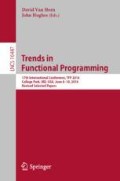Abstract
We present a generic framework that provides hints on how to achieve a goal to users of software supporting rule-based problem solving from different domains. Our approach consists of two parts. First, we present a DSL that relates and unifies different rule-based problems. Second, we use generic search algorithms to solve various kinds of problems. This solution can then be used to calculate a hint for the user. We present three rule-based problem frameworks to illustrate our approach: the Ideas framework, PuzzleScript and iTasks. By taking real world examples from these three example frameworks and instantiating feedback systems for them, we validate our approach.
Access this chapter
Tax calculation will be finalised at checkout
Purchases are for personal use only
References
Bylander, T.: The computational complexity of propositional STRIPS planning. Artif. Intell. 69(1–2), 165–204 (1994)
Fikes, R., Nilsson, N.J.: STRIPS: a new approach to the application of theorem proving to problem solving. Artif. Intell. 2(3–4), 189–208 (1971)
Galagan, N.I.: Problem description language SITPLAN. Cybern. Syst. Anal. 15(2), 255–266 (1979)
Gerdes, A., Jeuring, J., Heeren, B.: An interactive functional programming tutor. In: Lapidot, T., Gal-Ezer, J., Caspersen, M.E., Hazzan, O. (eds) Proceedings of ITICSE 2012: The 17th Annual Conference on Innovation and Technology in Computer Science Education, pp. 250–255. ACM (2012)
Hattie, J., Timperley, H.: The power of feedback. Rev. Educ. Res. 77(1), 81–112 (2007)
Heeren, B., Jeuring, J.: Feedback services for stepwise exercises. Sci. Comput. Program. 88, 110–129 (2014)
Heeren, B., Jeuring, J., Gerdes, A.: Specifying rewrite strategies for interactive exercises. Math. Comput. Sci. 3(3), 349–370 (2010)
Hewitt, C.: PLANNER: a language for proving theorems in robots. In: Proceedings of the 1st International Joint Conference on Artificial Intelligence, Washington, DC, May 1969, pp. 295–302 (1969)
Jeuring, J., et al.: Communicate!—A serious game for communication skills. In: Conole, G., Klobučar, T., Rensing, C., Konert, J., Lavoué, É. (eds.) EC-TEL 2015. LNCS, vol. 9307, pp. 513–517. Springer, Cham (2015). https://doi.org/10.1007/978-3-319-24258-3_49
Junghanns, A., Schaeffer, J., Sokoban: a challenging single-agent search problem. In: IJCAI Workshop on Using Games as an Experimental Testbed for AI Reasearch (1997)
Kovacs, D.L.: BNF definition of PDDL 3.1 (2011). http://www.plg.inf.uc3m.es/ipc2011-deterministic/attachments/OtherContributions/kovacs-pddl-3.1-2011.pdf
Kovacs, D.L.: A multi-agent extension of PDDL3. In: WS-IPC 2012, p. 19 (2012)
Lavelle, S.: PuzzleScript (2016). https://github.com/increpare/PuzzleScript
Lim, C.-U., Fox Harrell, D.: An approach to general videogame evaluation and automatic generation using a description language. In: Proceedings of IEEE CIG 2014: Conference on Computational Intelligence and Games, pp. 1–8 (2014)
Luger, G.F.: Artificial Intelligence: Structures and Strategies for Complex Problem Solving. Pearson Education, London (2005)
McDermott, D., et al.: PDDL-The Planning Domain Definition Language (1998)
Murray, T.: An overview of intelligent tutoring system authoring tools: updated analysis of the state of the art. In: Murray, T., Blessing, S.B., Ainsworth, S. (eds.) Authoring Tools for Advanced Technology Learning Environments, pp. 491–544. Springer, Dordrecht (2003). https://doi.org/10.1007/978-94-017-0819-7_17
Plasmeijer, R., Lijnse, B., Michels, S., Achten, P., Koopman, P.W.M.: Task-oriented programming in a pure functional language. In: Proceedings of PPDP 2012: Principles and Practice of Declarative Programming, pp. 195–206. ACM (2012)
Plasmeijer, R., van Eekelen, M.: Clean language report version 2.1 (2002)
Reinefeld, A.: Complete solution of the eight-puzzle and the benefit of node ordering in IDA. In: Proceedings of the 13th International Joint Conference on Artificial Intelligence, Chambéry, France, 28 August–3 September 1993, pp. 248–253 (1993)
Russell, S.J., Norvig, P.: Artificial Intelligence - A Modern Approach (3 International Edition). Pearson Education, London (2010)
Stutterheim, J., Achten, P., Plasmeijer, R.: Static and dynamic visualisations of monadic programs. In: Implementation and Application of Functional Languages, Koblenz, Germany, pp. 1–13, December 2015
Stutterheim, J., Achten, P., Plasmeijer, R.: C2 demo (2016). https://gitlab.science.ru.nl/clean-and-itasks/iTasks-SDK/tree/master/Examples/Applications/c2-demo
VanLehn, K.: The behavior of tutoring systems. Int. J. Artif. Intell. Educ. 16(3), 227–265 (2006)
VanLehn, K., et al.: The Andes physics tutoring system: lessons learned. Int. J. Artif. Intell. Educ. 15(3), 147–204 (2005)
Visser, E., Benaissa, Z.-E.-A., Tolmach, A.P.: Building program optimizers with rewriting strategies. In: Proceedings of the Third ACM SIGPLAN International Conference on Functional Programming (ICFP 1998), Baltimore, Maryland, USA, 27–29 September 1998, pp. 13–26 (1998)
Younes, H.L.S., Littman, M.L.: PPDDL1. 0: the language for the probabilistic part of IPC-4. In: Proceedings of the International Planning Competition (2004)
Acknowledgments
This research is supported by the Dutch Technology Foundation STW, which is part of the Netherlands Organization for Scientific Research (NWO), and which is partly funded by the Ministry of Economic Affairs.
Author information
Authors and Affiliations
Corresponding author
Editor information
Editors and Affiliations
Rights and permissions
Copyright information
© 2019 Springer Nature Switzerland AG
About this paper
Cite this paper
Naus, N., Jeuring, J. (2019). Building a Generic Feedback System for Rule-Based Problems. In: Van Horn, D., Hughes, J. (eds) Trends in Functional Programming. TFP 2016. Lecture Notes in Computer Science(), vol 10447. Springer, Cham. https://doi.org/10.1007/978-3-030-14805-8_10
Download citation
DOI: https://doi.org/10.1007/978-3-030-14805-8_10
Published:
Publisher Name: Springer, Cham
Print ISBN: 978-3-030-14804-1
Online ISBN: 978-3-030-14805-8
eBook Packages: Computer ScienceComputer Science (R0)

